The Singapore Biennale is here again. The limelight this time is stolen by Merlion Hotel, the key installation by Japanese artist Tatzu Nishi. From Yesterday.sg, I learnt about the Open House at Kallang Airport, one of the exhibition venues for the event. My eyes lit up at the mention of the collective term that suggests free admission and caution thrown to the wind (for example at Pasir Laba Open House we were allowed to fire our cameras). It would be a misnomer as I would discover from the official website: "Open House" is simply how this third Singapore Biennale is titled.
I had not stepped into Kallang Airport for a long time. My memory of the place was a throughfare, a short cut for folks approaching National Stadium (now demolished, a pity) or Indoor Stadium from Kallang MRT Station. The last time I spent considerable time inside, it was still the People's Association HQ and we were rehearsing for the National Day Parade to be held in the National Stadium. No prize for guessing I was there voluntarily or not.
On Sunday morning, I decided to visit an old friend the old way - via Kallang MRT Station (last time no Circle Line stations Stadium and Nicoll Highway, lah). I saw an usher outside the main gate which made me feel very welcome. Entering the compound, I saw a bicycle installation by Toast Box and realized airport and security go together (caution was definitely not thrown to the wind) which made me a little uncomfortable.
These people mean serious business in their all-black outfit, sunglasses, security earpiece and a shirt that screams SECURITY.
Toast Box set up shop inside Kallang Airport. Is it permanent, I mean the shop not the old structure, or only for this "Open House"?
What is a Biennale? From Wikipedia:
Biennale is Italian for "every other year" and can be used to describe any event that happens every two years. It is most commonly used within the art world to describe an international manifestation of contemporary art (for example, the "Biennale de Paris" which was created in 1959 by André Malraux).
To showcase the diverse visual arts internationally and locally and to dispel the myth of Singapore as a cultural desert (I hope the myth was shattered long ago), the organizers spared neither effort nor manpower and certainly not the minister to ensure the event's success. Frankly I am impressed by the mobilization effort and large volunteer turnout in the Open House events organized by the National Heritage Board (Singapore Biennale 2011 is organized by Singapore Art Museum). Guides and ushers were stationed at every installation and corner in Kallang Airport, reminding me of a similar enthusiastic group in the City Hall/Supreme Court Open House. Compare that with the mobilization and turnout for opposition canvassing and rallies, no wonder we say our youths are apathetic about politics.
As I arrived early before lunch, I saw visitors, many Caucasians among them, with passes - usher pass, media pass, guest pass etc. - hung around the neck. I must be the only visitor and shutterbug that morning with a keen interest in the architecture and history of Kallang Airport (airport was decommissioned since the 1950s). As I roamed the building now littered with installation props, I discovered "artwork" which may or may not belong to the Biennale. My exploration also revealed interesting architectural features like a mezzanine level in one of the blocks.
Did the last plane to land at Kallang "ferried truck loads of Swedish furnitures and meatballs"?
Who are the "Singaporean Boys and Girls" standing in strict attention? The SIA stewards and stewardesses?
Is this broken window pane a Biennale artwork or a sign of neglect (after PA shifted out)?
Guess which flight of stairs leads to the mezzanine level? From the mezzanine level where there was a small installation, I could look down and observe what the guide was doing.
The highlight and most ambitious installation at this Biennale venue must be this traditional German barn transposed into the hangar of Kallang Airport. From the description, "A building within a building, the barn represents a rural lifestyle and form of labour that is fast disappearing, particularly in such an urbanised country as Singapore".
In case youths (age 13-18) could not get it, there is separate description dedicated to them. The Youth Text reads:
Putting a German barn in a Singaporean airport hangar is very strange … A 'non-place' arises in both space and time and the artists fill this gap with their fairytale installation. Elmgreen and Dragset's alien insertion into the hangar could also make us think about the local 'black and white' houses built for colonial families and the question of why they are still popular with expatriates today.
Black and white traditional German barn in the airport hangar. Strange indeed!
Inside the barn. You can see performers with German styled farmer costumes in the background. The goat is a taxidermied one.
Kudos to the organizers for making the Biennale a family-friendly event. I was a little surprised to see a blown-up playground being set up in the morning, not a Biennale installation but to keep your kids busy. Not all installations are considered safe for kids, for example the film Theoreme is mildly R(A) (see screenshots), but if you searched hard enough, you would find installations that are fun, engaging and even educational.
Installation or shop selling household products? This could become museum display in many years to come.
Installation or tools for the Great Post-Biennale Cleanup? My sharp eyes also picked out the weapons on display.
This must be the most interactive installation in the Open House! By Rafael Lozano-Hemmer, "Frequency and Volume uses the shadows of visitors to tune into specific radio frequencies to provide a constantly shifting visual and sonic rendering of Singapore's radio spectrum".
The most intriguing installation must be this nondescript installation titled "The Dragon, The Purple Forbidden Enclosure 2011". Outside the enclosure, you are forewarned about its spiritual nature and that it may be uncomfortable for some viewers. On further reading, I found out the artist Dane Mitchell, who often references invisible forces in his work "has worked with a local medium to understand and channel the energies which exist within a particular space". What is that supposed to mean? To top it off, the guide, a sweet looking girl, offered to enhance my overall experience, "Sir, would you like to try the water spray?" I declined without second thought, not knowing the
Rows and rows of student artwork from many of the primary schools were on display. I even saw works from my alma mater! The thought of some of these children becoming future Biennale contributors in Singapore and elsewhere was heartening.





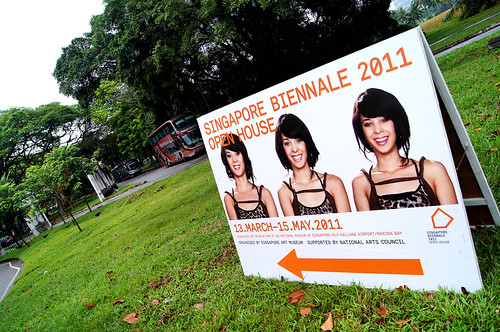
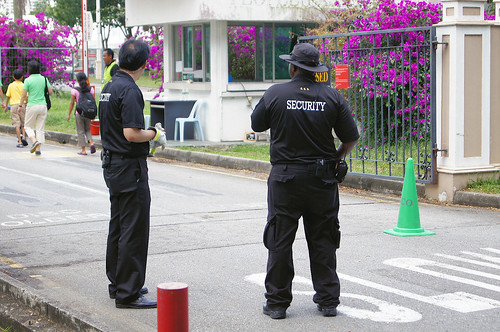
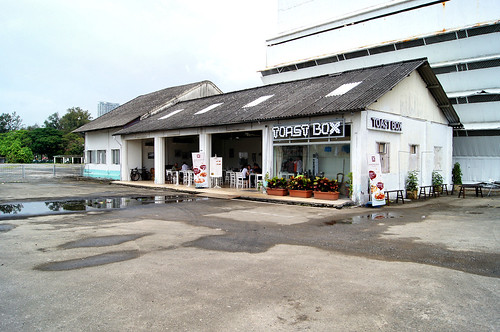
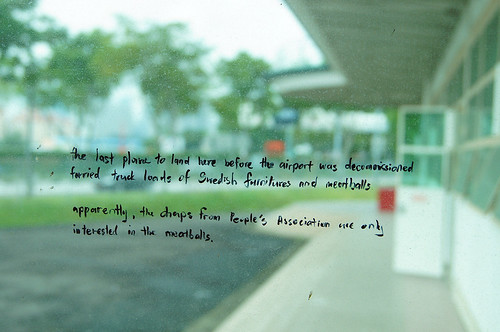
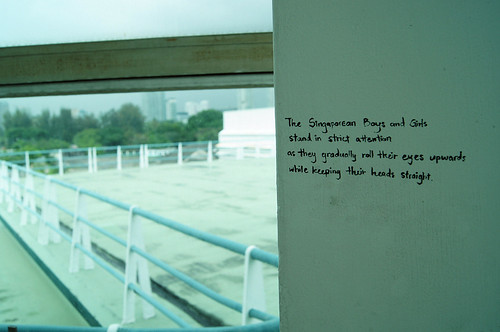
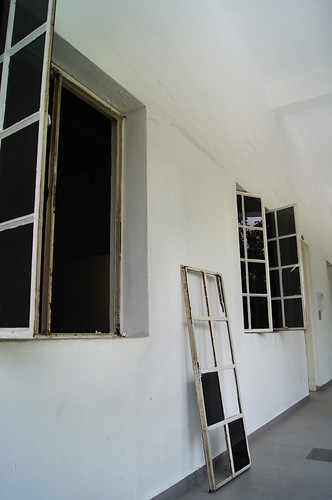
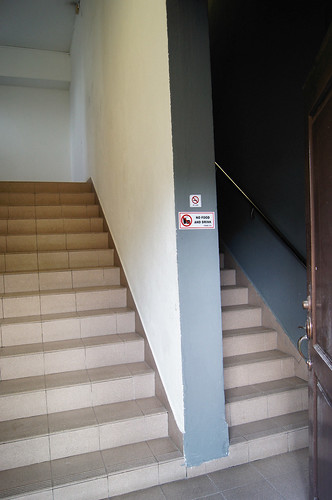
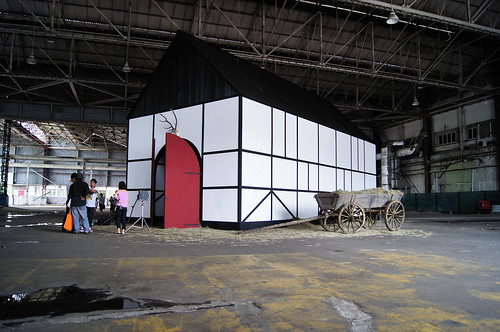
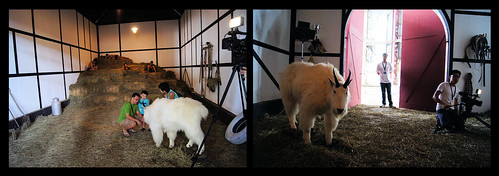
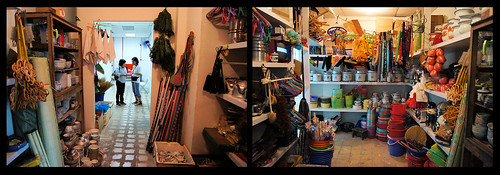
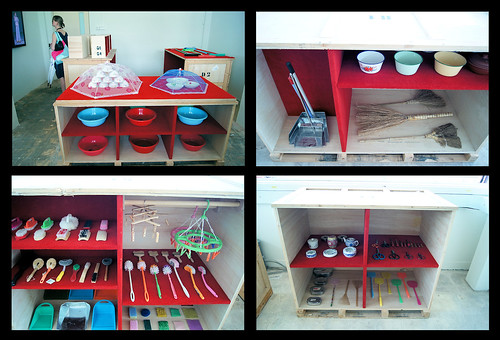
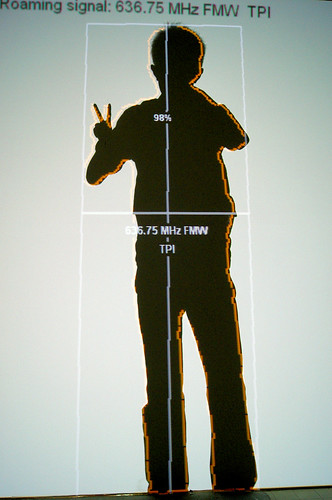
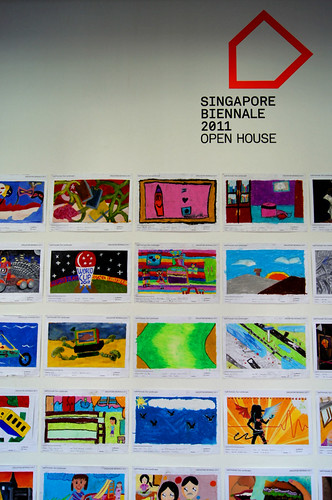










2 comments:
Are you trying to be cheeky or cute with your photo captions, they are horrible
Oops, so sorry that you had bad experience with them. Was trying to make the article lighthearted. Looks like failed. :(
Post a Comment